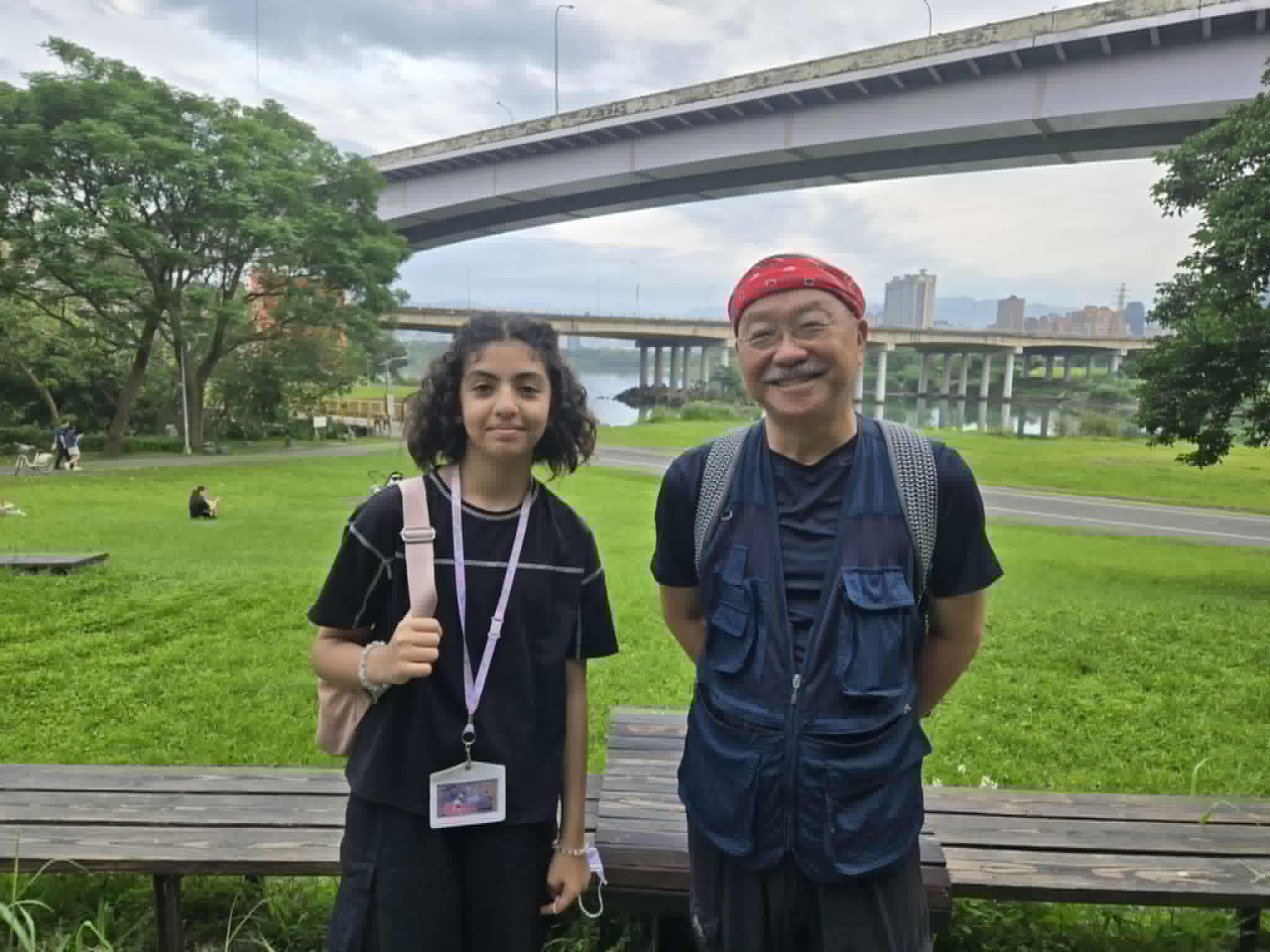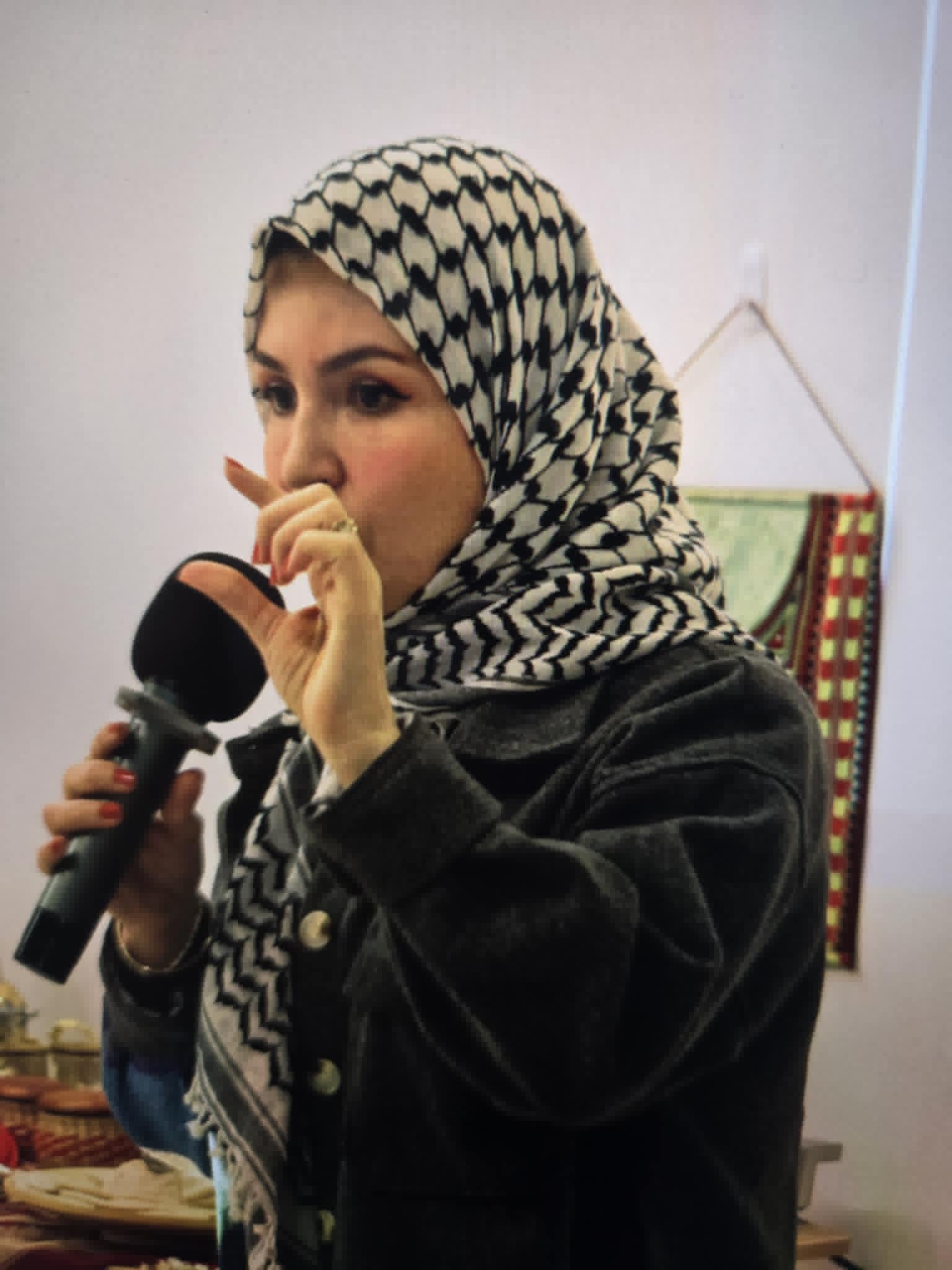【編按】本文作者為差事劇團負責人鍾喬。文章描寫一位母親與她11歲女兒Malak在加薩戰火下的生命經歷。母親Amel堅定表示,死亡是加薩人的日常,而她只希望能與女兒共生共死。鍾喬引用韓國作家韓江的詩句「是死亡拯救了活著的人」並指出在加薩,餓死的人往往比轟炸而死者更痛苦,也更能喚醒世人反思政治暴力與人道危機。Malak自小歷經流離,卻展現出超齡的成熟與表達力,曾以流利中文為巴勒斯坦發聲。鍾喬與她和母親共同策劃戲劇課,並希望她能將加薩童年的創傷轉化為劇場敘事。
我在筆記本中寫著:母親抱著1歲的女兒,不放……。抬起頭來,繼續聆聽眼前的母親,如何在他女兒面前,和我講述他們在加薩的生命經驗,母親說,其實死亡對加薩人而言,是日常需面對的事情,我無論如何只想與孩子共生死。
我心頭揣著:無路可退,四個字;但,當我抬頭看著眼前的母親,卻又在他沉默的每一刻間,閱讀到她毅然的心思。於是,我想起韓國作家 韓江 在【永不告別】裡,為濟州島4.3殺戮記憶 寫下的詩行:
其實 是死亡拯救了活著的人
我認為這句話,有其深意;就向母親說了:在加薩,是亡者拯救了活著的人。母親的答覆很有啟發性,也很犀利。伊說:我們懷著這樣的信仰,當然可貴,但事實上,在我先生的家鄉—加薩,因飢餓而死去的人,遠比轟炸致死的人,飽受更多的折磨。他們逐漸死去的折騰能喚回活著的人,重新去思考這個透過政治霸權搬弄人間是非,並留下血腥罪責的殘酷世界嗎?
穿透黑暗 如何見到光明 我問

這是戲劇工作坊的第一天;但我們沒有做戲劇練習。我們深入聊了很多問題,Malak 是咖啡桌上的女兒,11歲的她已有18歲的應對與機智,我想這和她的成長需在流離中見生存的真章,有密切的關聯。我們上回在聲援巴勒斯坦的【西門捷運站】口相見,她一口流利中文的演說,動人而銳利。下台後,我們相遇,她說:戲劇是她從小的最愛,於是她轉來描繪童年戲劇愛好的鉛筆畫,我和她與她美麗的媽媽一起規劃了戲劇的課程。
我邀了關切她們當下與未來的惠珍一起探討流離的議題;Leo是紀錄片工作者,他恰在拍攝相同的議題。我說:一起來吧!一起來關切集體創傷如何被記錄並表現的主軸。
於是,也有了紀錄工作可以佐證所思與所為;這都只是開始,眼前要有漫漫長路的反思,作為共學的作息!
期待Malak可以在她母親關切的集體創傷軸線下,將她們母女在加薩的生與死,轉作劇本敘事,若有可能,則融合進殺戮記憶玉當下的表演敘事與現場中!

Malak 的母親 Amel 嫁給來台的加薩學者,她自己是心理學家,在阿爾及利亞獲致心理學博士;她的家鄉在北非,她說:民間一般人都認同加薩是一個獨立自主的國家,也絲毫不排斥巴勒斯坦人;至於官方,在國際霸權的推波下,則難以自主…。
Amel 說話充滿自信,自然不缺女性與作為母親的細膩,我在和她交談中,偶而會想起法蘭茲 法農Franze Fanon這樣的第三世界抵抗心理學家,或許曾經帶給她深刻影響。因為,交談中,即便談的是孩子的教育經驗,她也經常從社會壓迫或者移民問題,切入集體創傷的問題。
她說:她很認同「Augusto Boal」的「Theatre Of The Oppressed」波瓦的被壓迫者劇場!我想一定是如此吧!我期待她們母女盡早完成加薩記轟炸下的記憶書寫,可以放進Malak 的劇場工作坊排練行程中。
我總是想:Malak 可以用身體訴說她的加薩童年;讓更多世人感知:她的成長如何在災難中轉為文化行動的動人表述。
她,是動人的……
Gaza Childhood
I wrote in my notebook: Mother hugs her 1-year-old daughter and won’t let go… I raised my head and continued to listen to the mother in front of me telling me about their life experiences in Gaza in front of her daughter. The mother said that in fact, death is an everyday thing for the people of Gaza, and I just want to share life and death with my child no matter what.
I kept in my mind: There is no way to retreat; but when I looked up at the mother in front of me, I could read her resolute thoughts in every moment of her silence. Then, I remembered the poem written by Korean writer Han Jiang in “Never Goodbye” about the memory of the April 3 massacre on Jeju Island:
In fact, it is death that saves the living.
I thought this sentence had a profound meaning, so I told the mother: In Gaza, it is the dead who save the living. The mother’s response was both illuminating and incisive. she said: It is certainly valuable that we hold such a belief, but the fact is that in my husband’s hometown, Gaza, the number of people who died of hunger is far greater than those who died from bombing. Can their gradual death bring back the living and make them rethink this cruel world that stirs up trouble in the world through political hegemony and leaves behind bloody crimes?
How to see the light through the darkness, I ask
It was the first day of the theatre workshop; but we didn’t do any theatre practice. We talked in depth about many issues. Malak is the daughter on the coffee table. At the age of 11, she has the coping and wit of an 18-year-old. I think this is closely related to her growth and the need to survive in displacement. The last time we met at the Ximen MRT Station to show support for Palestine, her speech in fluent Chinese was moving and sharp. After we got off the stage, we met and she said: theatre was her favorite since childhood, so she turned to me pencil drawings to depict her childhood love of performance. She and I planned theatre courses with her beautiful mother.
I invited Hui-zhen, who is concerned about their present and future, to discuss the issue of displacement; Leo is a documentary worker who was filming the same issue. I said: Let’s come together!
Together, we look at the axis of how collective trauma is recorded and represented.
Therefore, there is also record-keeping work to prove what we think and do; this is just the beginning, there is a long road of reflection ahead as a seat for common learning!
I hope that Malak can transform the life and death in Gaza into a script narrative under the axis of collective trauma that her mother is concerned about, and if possible, integrate it into the current performance narrative and scene of the Killing Memory Jade!
Malak’s mother Amel married a Gazan scholar who came to Taiwan. She herself is a psychologist and obtained a doctorate in psychology in Algeria. Her hometown is in North Africa. She said: The general public in Algeria agrees that Gaza is an independent country and does not exclude Palestinians at all. As for the official, it is difficult for them to be independent under the instigation of international hegemony…
Amel spoke with confidence, and naturally she was feminine and delicate as a mother. When I talked to her, I occasionally thought of third world resistance psychologists like Franze Fanon, who may have had a profound impact on her. Because, during conversations, even when talking about her children’s educational experiences, she often cuts into the issue of collective trauma from the perspective of social oppression or immigration issues.
She said: She really identified with Augusto Boal’s “Theatre Of The Oppressed”! I think that must be the case! I hope that mother and daughter can finish writing their memories of the bombing childhood in Gaza , although it’s cruel and sad, it possibly include it in Malak’s theatre workshop rehearsal schedule.
I always thought that Malak could use her body to tell the story of her childhood in Gaza and let more people know how her growth was transformed into a moving expression of cultural action in the disaster.
She is a touching girl will become a good performer when memory link with her children or even baby …

